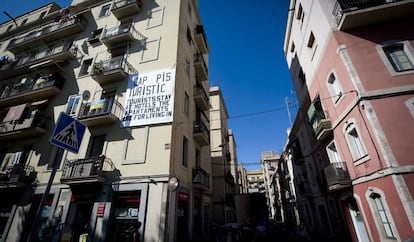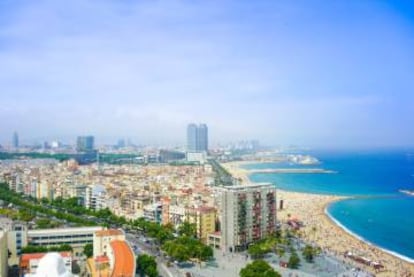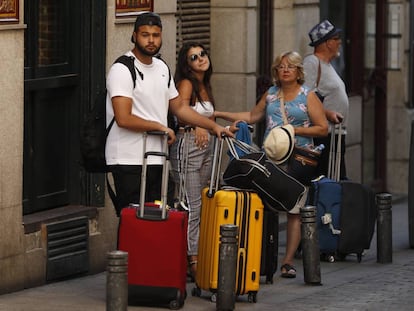The battle against vacation rentals spreads beyond Madrid
Barcelona, Valencia and Palma have also approved regulations to curb the rapid growth in the supply of unlicensed short-stay tourist accommodation

The web of legislation surrounding short-term vacation rentals in Spain keeps growing: the city of Madrid has just approved new regulations to curb a practice that has come under the spotlight in a country with record-breaking tourist numbers.
With growing numbers of apartments now being used for short-term tourist accommodation, authorities are faced with the question of how to keep neighborhoods habitable for permanent residents while hundreds of tourists walk in and out of residential buildings at all hours of the day and night.
Besides the tax regulations, which are effective nationwide, there are regional, municipal and even neighborhood rules to consider
The response in Spain has been a proliferation of rules at every level of government, leading to a situation in which what¡¯s allowed in one municipality may be forbidden in the next town over.
Besides the tax regulations, which are effective nationwide, there are regional, municipal and even neighborhood rules to consider. Powers over tourism are devolved to the 17 regions of Spain, and these have attempted to pass legislation to regulate private properties being used as short-term holiday rentals.
Cities have also passed their own bylaws, which are more or less strict depending on who is in power and on the tourism numbers involved. In some cities, specific neighborhoods have incorporated rules as well. The cities that have done the most to regulate vacation rentals are Barcelona, Valencia, Palma, and now Madrid as well.
Madrid: a curb on professionalized rentals

The city council has approved a new plan affecting apartments that are rented out to tourists more than 90 days out of the year. These will now require a special license, and in order to obtain it, the apartment will have to have a separate entrance. In practice, this will leave out around 95% of existing ¡°professional¡± vacation apartments. Violators cannot be fined, but authorities can initiate proceedings for operating without a license.
What the city is doing is using its zoning authority to create new license requirements for what it now views as a tertiary sector activity. These apartments are now considered the equivalent of hotels and B&Bs. Powers over tourism per se are in the hands of the Madrid regional government, which is working on a decree of its own to regulate short-term tourist accommodation.
Valencia: only over stores?

In the Valencia region, it is up to municipal authorities to regulate the use of short-term tourist rentals. In the city of Valencia, registered holiday rentals can only be located above business premises and under residential homes. They may not be located on the same floor as regular homes, and less than 50% of building units may be used for short-term rentals, otherwise the entire building would be considered to be engaging in tertiary sector activities.
The city also distinguishes between properties that are rented out 365 days out of the year, and those whose owners rent them out sporadically when they themselves are away on holidays. In this second case, there is no specific time limit, although some neighborhoods are introducing added limitations.
This is the case in the historical city center, Ciutat Vella, and in El Cabanyal, located by the beach. In this area, homeowners are allowed to rent out their properties for a maximum of 60 days out of the year, although authorizations for this activity have been halted due to saturation and resident complaints.
In fact, Valencia has hardly issued any authorizations ever since the regional government passed a new tourism law in 2018. City officials have received around 80 applications but granted only 18, according to Deputy Mayor Sandra G¨®mez.
Barcelona: licenses on hold since 2014

In Barcelona, shutting down illegal vacation rental properties has been one of the main battles of Mayor Ada Colau, a former housing activist who says tourism is driving up rent and pushing thousands of residents from their homes.
There are 9,600 legal tourist apartments in the city, and authorities stopped issuing new licenses in 2014, under then-mayor Xavier Trias. By then, there had been ongoing friction between visitors and local residents in the neighborhoods with the highest tourist numbers.
In 2016, Colau introduced an action plan to close down unlicensed properties. She created a team of ¡°visualizers¡± who combed the streets, created a website to make it easy for residents to report illegal tourist apartments, and used computer tracking software to search listings on platforms such as Airbnb or Homeaway. Up to 17,000 homes listed on 140 websites were scrutinized.
Three years later, Colau says that the supply of illegal apartments on offer has dropped by 95%, that 4,900 have been shut down, and 6,500 fines issued, some of them as high as €30,000.
Palma: the strictest rules

In the city of Palma, on the Balearic Island of Mallorca, there is a complete ban on renting apartments out to tourists. In April, the city approved an ordinance that only allows this activity in stand-alone homes and in properties located in industrial areas, near the airport and on rural land. The leftist coalition in power ¨C the Socialist Party (PSOE), M¨¦s and Podem ¨C made the decision after commissioning several reports showing that unregulated holiday rental homes shot up 50% between 2015 and 2017. In Palma, only 645 of the offered homes had a license to operate as a tourist apartment.
Elsewhere in Mallorca, short-term vacation rentals are only authorized in some municipalities based on occupation, zoning and saturation criteria. A regional law passed in 2017 forces owners to obtain a registration number from the Balearics tourism department, or risk a €40,000 fine. There are also sanctions for online platforms that list unlicensed properties. AirBnB, Homeaway and TripAdvisor have already been slapped with more than €300,000 in fines each.
English version by Susana Urra.
Tu suscripci¨®n se est¨¢ usando en otro dispositivo
?Quieres a?adir otro usuario a tu suscripci¨®n?
Si contin¨²as leyendo en este dispositivo, no se podr¨¢ leer en el otro.
FlechaTu suscripci¨®n se est¨¢ usando en otro dispositivo y solo puedes acceder a EL PA?S desde un dispositivo a la vez.
Si quieres compartir tu cuenta, cambia tu suscripci¨®n a la modalidad Premium, as¨ª podr¨¢s a?adir otro usuario. Cada uno acceder¨¢ con su propia cuenta de email, lo que os permitir¨¢ personalizar vuestra experiencia en EL PA?S.
En el caso de no saber qui¨¦n est¨¢ usando tu cuenta, te recomendamos cambiar tu contrase?a aqu¨ª.
Si decides continuar compartiendo tu cuenta, este mensaje se mostrar¨¢ en tu dispositivo y en el de la otra persona que est¨¢ usando tu cuenta de forma indefinida, afectando a tu experiencia de lectura. Puedes consultar aqu¨ª los t¨¦rminos y condiciones de la suscripci¨®n digital.










































